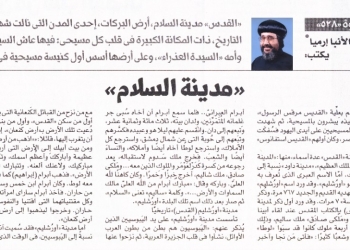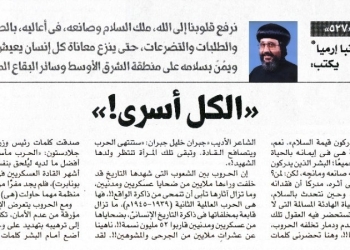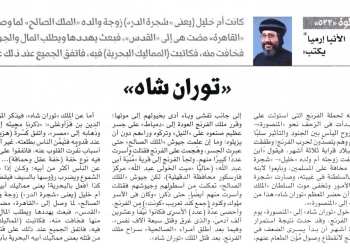In some of the previous articles, we spoke of Egypt’s proconsuls during al-Amin’s tenure, his wars with al-Ma’mun, as well as the effect of these wars on Egypt: for she witnessed severe conflicts between her proconsuls and their supporters, in addition to riots and tumult.
We started talking about Caliph al-Ma’mun whose tenure was divided into two terms. The first lasted from 198-204 Hijri (813-819 A.D.). He spent it in Merv, whereby al-Fadl bin Sahl had the upper hand in running the State, which resulted in two issues. Some historians maintain that he did his duty very well. Meanwhile, others assert that he never kept al-Ma’mun informed of what was going on through the State, and that he had the Caliph issue two decrees to oust commanders Tahir bin al-Hussein and Hartama bin A’yan from Baghdad, which ignited tumult and rebellions in the city.
The first issue was related to appointing his brother al-Hassan bin Sahl proconsul on all the provinces he had conquered, namely, Persia, Ahvaz, Basra, Kufa, Hejaz, and Yemen. So, he sent Tahir the caliph’s order to hand over the new proconsul all his responsibilities and head to al-Raqqah to overcome Nasr bin Shabath who rebelled for the murder of his friend al-Amin. So, Tahir implemented the caliph’s order. Yet, he was upset as the order implied that he take over Mosul, al-Jazeera, Morocco, and the Levant. Nasr emerged victorious, only to resume his rebellion until 210 Hijri (825 A.D.)
The second issue was related to Hartama when he was ordered to head to Khorasan. So, he left Iraq and went there. Thus, Iraq became void of the authorities which could have calmed down the tumult. To make matters worse, the Hashemite tribe and the elites became upset of al-Ma’mun’s surrendering to his minister al-Fadl. Thus, the country’s order and security were shaken.
Mohammed bin Ibrahim’s Rebellion
Mohammed bin Ibrahim was supported by one of Hartama’s faithful men, Abu al-Saraya al-Sirri bin Mansur. He rebelled and seized Basra. He minted coins that bore his name and defeated al-Hassan bin Sahl’s army, to start his call in Arabia. Yet, due to Mohammed’s sudden death in 199 Hijri (815 A.D.), Abu al-Saraya appointed Mohammed bin Yazid, an Alawite, in his stead, which made al-Hassan send another army to fight Abu al-Saraya. Yet, the latter emerged victorious, thus becoming, along with the Alawites, more influential. In effect, al-Hassan feared lest rebellions and seditions increase. So, he sent to Hartama asking him to allow him return to Baghdad to overcome the rebellion. Yet, being on his way to Khorasan, he refused. But, as al-Hassan insisted, he returned and overtook al-Mada’in and defeated the rebels.
Then, Hartama entered Kufa and secured its people. Meanwhile, Abu al-Saraya fled to al-Qadisiyyah, Persia, then Sous. There, he fought al-Ma’mun’s troops, was wounded, arrested and put to death. Thus, the rebellion which lasted for ten months came to an end, after which al-Ma’mun’s army led by Hartama retrieved the cities which rebels had snatched, namely, Basra, Hejaz, Yemen and others.
Hartama Dies
Hartama succeeded in overcoming the rebellions that broke out in Iraq, Hejaz, and Yemen. Al-Ma’mun assigned him the affairs of Syria and Hejaz; but Hartama decided to go to Merv and meet al-Ma’mun to let him know of what has become of the State, and warn him against being away from Baghdad. Some historians maintain that no sooner had al-Fadl bin Sahl got to know of Hartama’s intention, he started reporting the latter to al-Ma’mun.
When Hartama reached al-Ma’mun, the latter was quite harsh with him. So much so that he ascribed Abu al-Saraya’s rebellion to the fact that Hartama was a disobedient soldier, having not received his assignments. No sooner had Hartama started to speak than the guards attacked him and started to beat him hard, after which they took him to prison where he died shortly due to his wounds. Some historians assert that he died because al-Fadl sent men who killed him in his prison. Others write, “Thus the great commander, who defended al-Ma’mun’s authority and struggled to fortify the State from Africa to Khorasan, died. Indeed, al-Ma’mun’s triumph over al-Amin is ascribed to him. The great commander was the victim of reporting, ungratefulness, and conspiracies, just like his great counterparts.”
After Hartama’s death, the soldiers rebelled in Baghdad. They ousted its ruler, al-Hassan bin Sahl. Disorder, seditions, and murder prevailed. These conditions lasted until the city’s elites agreed to confront the disorder. They retrieved Baghdad’s security, after which they tried to persuade al-Mansur bin al-Mahdi to become caliph, but he refused, preferring to rule the city under al-Ma’mun’s dominion. Then, the city’s elites reconciled with al-Hassan, restored him to Baghdad’s leadership in 200 Hijri (816 A.D.) Thus, order was also restored. Yet, turmoil broke out once more when al-Ma’mun declared Ali al-Redha heir apparent.
A New Conflict
Because al-Ma’mun decided to choose an Alawite to succeed him, he declared Ali al-Redha bin Mussa al-Khadim heir apparent, announcing that he found none of the Abbasids suitable for the caliphate. This ignited the fury of Baghdad’s people. Therefore, they decided to oust al-Ma’mun and pledge allegiance to Ibrahim bin al-Mahdi who was al-Amin’s friend. He was declared caliph in Baghdad. Yet, matters did not go the way they were planned to, for Ibrahim lacked in administrative adeptness. In effect, he could not handle the country’s affairs, which aroused tumult. War broke out between al-Ma’mun’s sentries and those of the new caliph.
Rebellion moved from Baghdad to the rest of the cities, like Kufa. Disorder prevailed. So, Ali al-Redha hurried to al-Ma’mun to inform him of what had happened and what he was unaware of, in addition to the outcomes of al-Fadl’s deeds. Al-Ma’mun got furious and started to seek the truth. Getting to know it was true, he left Merv and headed to Baghdad, having taken his friends’ advice. He was accompanied by his minister al-Fadl bin Sahl.
As he was resting on the way, al-Fadl was murdered. This took place in 202 Hijri (818 A.D.) Al-Ma’mun had the perpetrators arrested and executed, after which he resumed his journey, to stop at Tous where his father was buried. There, he spent a few days to rest. At the beginning of 203 Hijri (811 A.D.), Ali al-Redha died, which saddened al-Ma’mun. He sent a message to Baghdad’s people informing them of Ali’s death and asking them to succumb to him, for, already, the reason for the rebellion had gone. They accepted his call, especially after the enfeeblement of the country due to Ibrahim’s unwise management. Thus, al-Ma’mun resumed his journey to Baghdad, only to start a new story. Stories never end in Beautiful Egypt.
General Bishop
Head of the Coptic Orthodox Cultural Center









